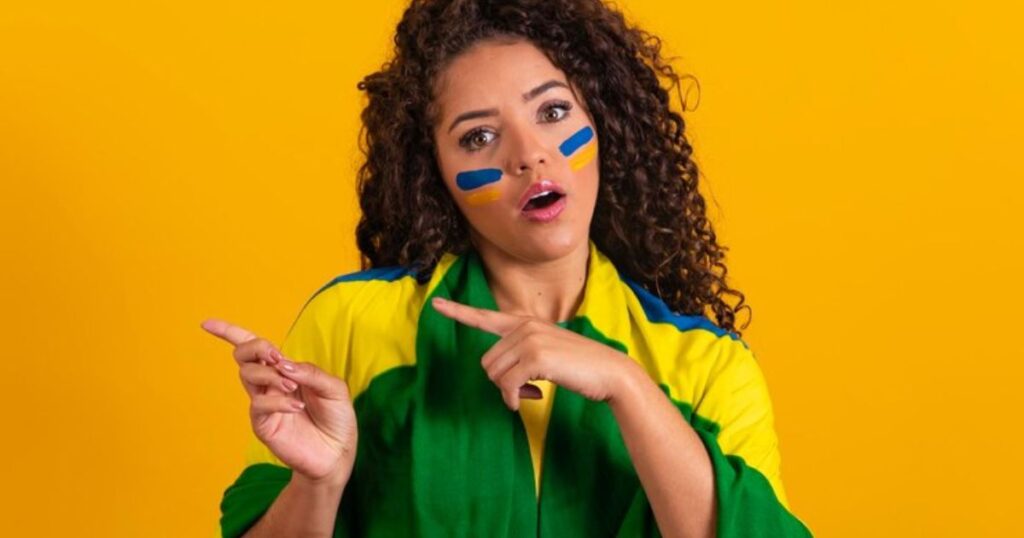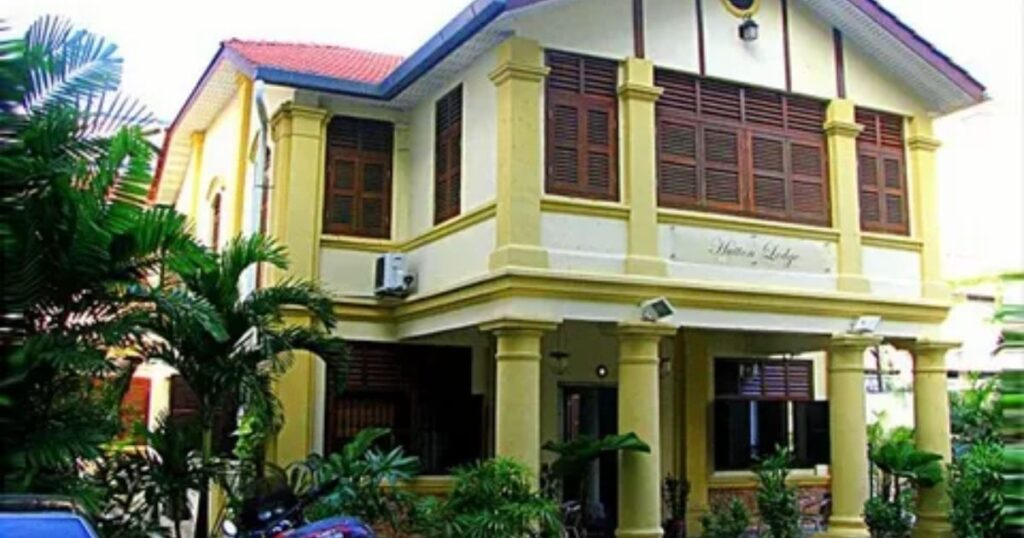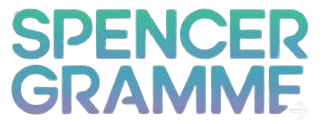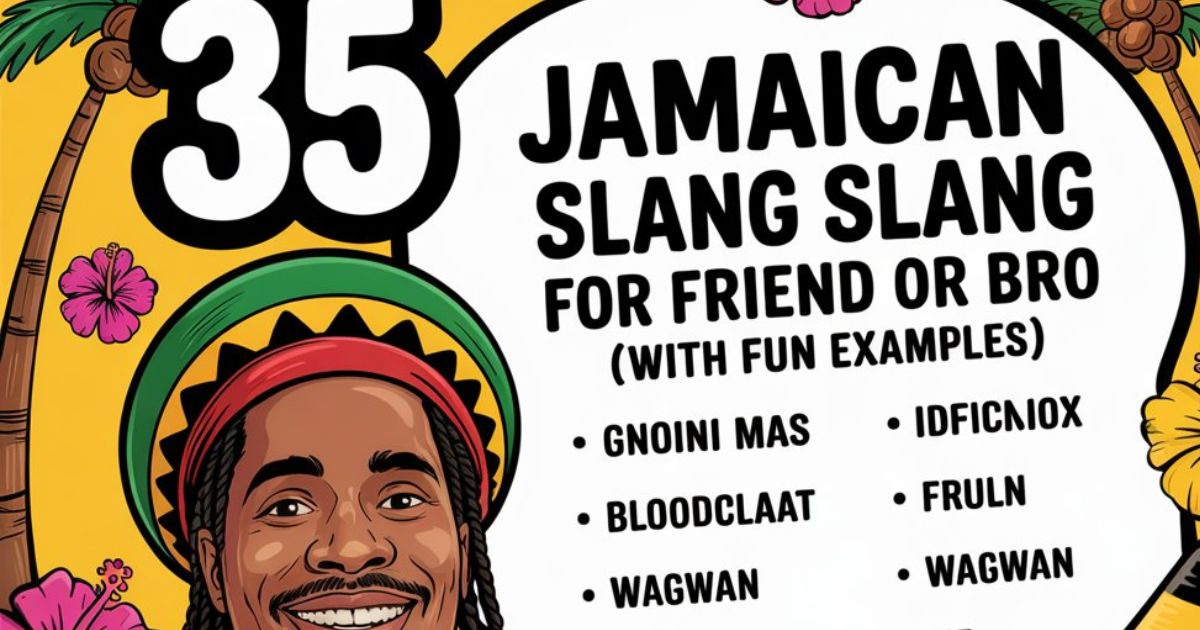Jamaican slang for friend or bro is a fun and meaningful part of the island’s culture. It adds real energy to how people connect and show respect. Whether you’re hearing someone say “mi bredda” or calling a friend “dawg,” the Jamaican slang for friend or bro brings conversations to life. These phrases are filled with warmth, loyalty, and love. The Jamaican word for friend is more than just a title. It’s about real bonds, trust, and good vibes.
If you’re wondering how to say brother in Jamaican, there are many cool and heartfelt ways. Jamaican slang for brother often includes words like “bredren,” “brogad,” and “mi fam.” Each term reflects closeness and pride. Brother in Jamaican slang goes beyond family ties. It can be used between best friends or anyone you respect deeply. Learning the Jamaican slang for friend or bro helps you connect and truly understand the culture from the heart.
What is Jamaican Slang? A Quick Introduction

Jamaican slang is a unique and colorful way of expressing oneself, often used in everyday conversations. The language draws on a rich mix of African, English, and other Caribbean influences. Among the many expressions, Jamaican slang for friend or bro is a common and beloved part of local culture. People often use these terms to show camaraderie and affection. Whether you’re hanging out with your best friend or talking to your brother, understanding Jamaican slang for friend and Jamaican slang for brother can help you connect with the vibrant culture.
When it comes to the Jamaican slang for friend, words like “bredrin” and “yute” are widely used. These terms are often interchangeable when referring to close friends or acquaintances. Similarly, for referring to a brother, how to say brother in Jamaican is a simple matter of using expressions like “bredrin” or “fam.” The brother in Jamaican slang often reflects a sense of unity and closeness, symbolizing the deep bonds between people.
If you’re learning how to speak Jamaican Patois, knowing the Jamaican word for friend or Jamaican slang for brother is a must. Whether you’re asking about someone’s Jamaican slang for friend or saying “Mi deh wid mi bredrin,” you’ll be able to use these words to connect more authentically. These terms capture the spirit of friendship and kinship in Jamaican culture.
List of All Jamaican Slang for Friend or Bro
Jamaican slang for friend or bro is not only used to refer to close relationships but also reflects the warm and communal culture of Jamaica. These terms help bring people together, often used in casual conversations to express familiarity and deep bonds. Whether you’re learning the Jamaican slang for friend or bro or already familiar with it, the following list will help you understand how to use these terms in context.
| Slang Term | Meaning | Usage Example |
| Bredrin | Friend, buddy, or mate | “Mi deh wid mi bredrin all day.” |
| Yute | Youth, friend, often a younger person | “Me and mi yute deh pon di block.” |
| Fam | Short for family, close friend | “What’s up, fam? How you been?” |
| Dawg | Close friend or bro | “Mi dawgs always got mi back.” |
| Bwoy/Bway | Used for a male friend or bro | “Mi bwoy dem always round mi.” |
| Gyal | Female friend or sister | “Mi gyal, mi love di vibes.” |
| Pal | Close friend, buddy | “Mi pal and mi deh pon di road today.” |
| Gwan | A term for friend or mate | “Gwan mi yute, mi deh with you.” |
| Likkle Man | A small or young friend | “Di likkle man from di corner deh.” |
| Bridgy | Another term for a close friend | “Mi and mi bridgy always link up.” |
| Shotta | Close associate or friend | “Mi shotta dem deh mi yard.” |
| Chune | Friend or close acquaintance | “Me and mi chune deh for di day.” |
| Runz | Close companion or mate | “Mi runz dem always deh fi mi.” |
| Likkle Sis/Bro | A term of endearment for a younger sibling or close friend | “Mi likkle bro is mi right hand.” |
| Homey | Casual term for a close friend | “Mi homey and mi deh out fi di day.” |
These Jamaican slang for friend or bro terms are commonly used in both casual and intimate settings, helping to build stronger connections. Knowing Jamaican slang for brother or how to say brother in Jamaican will help you navigate friendships and family relationships in a more authentic way.
Popular Jamaican Slang for Friend or Bro
Jamaican slang for friend or bro plays a significant role in expressing closeness and loyalty within the community. Jamaican slang for friend and Jamaican word for friend are not just casual terms but signify a connection that goes beyond words. If you’re wondering how to say brother in Jamaican, expressions like “bredrin” and “mi fam” are commonly used, representing both brother in Jamaican slang and a close friend.
Brogad
“Brogad” is a popular Jamaican slang term used to refer to a close friend or brother. It’s often used to express a sense of camaraderie and loyalty. Whether in the streets or at home, it’s a term that signifies a bond that goes beyond just friendship.
Example:
“Mi and mi brogad a go link up later.”
Mi G
“Mi G” is a term used to refer to a trusted friend, often someone you have a deep connection with. It’s short for “Mi General,” showing respect and closeness. It’s commonly used among men but can be used for both genders.
Example:
“Big up mi G, mi deh with yuh 100%.”
Chargie
“Chargie” is another term for a close friend or mate. It carries a sense of trust and friendship, often used to show that someone has your back. It’s a casual yet affectionate term among friends.
Example:
“Mi chargie, mi ready fi di action.”
Fam
“Fam” is short for family, but it’s often used to refer to close friends who feel like family. It’s a term that expresses a deep connection and loyalty, making it a go-to term in the Jamaican community.
Example:
“Mi fam always deh fi mi when mi need dem.”
Linky
“Linky” is a friendly and informal term used to describe a friend or someone you connect with. It’s often used when you want to show closeness, and it’s a way of saying you’re tight with someone.
Example:
“Mi linky and mi deh pon di road.”
Bredren & Sistren
“Bredren” refers to a male friend or brother, while “Sistren” refers to a female friend or sister. Both terms are used to describe close friendships, especially within the Jamaican community.
Example:
“Mi bredren and mi sistren deh wit mi today.”
Yute
“Yute” is often used to refer to a younger friend or a person in general. It’s a versatile term that can be used to show respect or affection toward someone, regardless of age.
Example:
“Mi yute, how yuh feel today?”
Pari
“Pari” is a term used for a close friend or companion. It’s typically used in a more relaxed setting and indicates someone who shares fun moments or is always around for a good time.
Example:
“Mi and mi pari always a gwaan fi di fun.”
Dawg
“Dawg” is a popular term for a close male friend or brother. It signifies loyalty, and it’s often used in the context of people who are like family to you.
Example:
“Mi dawgs always got mi back no matter what.”
Jamaican Slang For Friends
Jamaican culture is filled with unique slang, especially when referring to friends and close companions. These expressions are more than just words; they represent the strong bonds of friendship and camaraderie. Below are some of the most popular Jamaican slang for friend or bro that are frequently used in Jamaican conversations:
1. Bredren / Sistren
- “Bredren” refers to a male friend or brother.
- “Sistren” is used for female friends.
- Example: “Mi bredren help mi fix up mi car di other day.” (My friend helped me fix my car the other day.)
2. Parri / Pari
- “Parri” or “pari” is used to describe a close friend or buddy.
- It’s often used to refer to someone you share good times with.
- Example: “Mi parri always know how fi make mi laugh.” (My friend always knows how to make me laugh.)
3. Yute
- “Yute” refers to a younger friend or someone in your social circle.
- Commonly used as an informal address.
- Example: “Mi yute, yuh ready fi di party tonight?” (My friend, are you ready for the party tonight?)
4. Pardner
- “Pardner” is a term for a close associate or companion.
- Often used for business or personal partnerships.
- Example: “Mi pardner and mi a link up fi di project later.” (My business partner and I are meeting for the project later.)
5. Don / Don Dadda
- “Don” refers to a powerful or influential person.
- “Don Dadda” is an elevated term used for someone with great status.
- Example: “Di Don Dadda a mi street always have di best food.” (The leader in my neighborhood always has the best food.)
6. Umbri
- “Umbri” is a casual term for a close male friend.
- Often used in friendly, laid-back conversations.
- Example: “Mi umbri a di one who teach mi how fi play football.” (My bro is the one who taught me how to play football.)
7. Dawg / Dawdi
- “Dawg” is a term used to refer to a close male friend.
- “Dawdi” is an affectionate variation.
- Example: “Mi dawdi a di one who always have mi back.” (My friend is the one who always has my back.)
8. Dupes
- “Dupes” refers to a very close or best friend.
- Used for someone you deeply trust and confide in.
- Example: “Mi and mi dupes a always have di best times together.” (My best friend and I always have the best times together.)
9. Dappa
- “Dappa” describes a stylish or confident friend.
- It’s someone who is admired for their fashion sense and presence.
- Example: “Mi dappa friend always step out inna fresh clothes.” (My stylish friend always steps out in fresh clothes.)
10. Lyah
- “Lyah” is a playful term for a close friend.
- Used in an affectionate, casual way.
- Example: “Lyah, mi cyaan believe di ting dem just happened!” (Bro, I can’t believe what just happened!)
12 More Jamaican Phrases for Friends & Everyday Life
Jamaican slang is known for its lively and expressive nature, especially when it comes to friendships and daily interactions. Here are 12 more popular Jamaican phrases that capture the spirit of everyday life and the warmth of Jamaican culture.
1. Wah Gwaan? – A common greeting used to ask, “What’s going on?” or “How are you?”
- Example: “Wah gwaan, mi fren?” (How’s it going, my friend?)
2. Mi Deh Yah – A response indicating you’re present, doing well, or available.
- Example: “Wah gwaan?” “Mi deh yah.” (What’s up? I’m good.)
3. Mi Nuh Know – Used to express uncertainty or when you don’t have an answer.
- Example: “Mi nuh know di time.” (I don’t know the time.)
4. Fi Real – A phrase used to emphasize truth or agreement, like saying “seriously” or “for real.”
- Example: “Dat mi favorite song, fi real!” (That’s my favorite song, seriously!)
5. Gwaan – Used to encourage someone, meaning “go ahead” or “keep going.”
- Example: “Gwaan, mi bredda, yuh got dis.” (Go on, my brother, you got this.)
6. Mi A Go – A way of saying “I’m leaving” or “I’m heading out.”
- Example: “Mi a go, cyaan stay any longer.” (I’m leaving, can’t stay any longer.)
7. Mi Good – Means everything is fine, or you’re doing well.
- Example: “Mi good, mi just a take it easy.” (I’m good, I’m just relaxing.)
8. Chill Out – A phrase used to tell someone to relax or take things easy.
- Example: “Chill out, mi fren, everything a go be alright.” (Relax, my friend, everything will be fine.)
9. Big Up – Used to show respect, give props, or acknowledge someone.
- Example: “Big up to all di people who support mi work.” (Respect to all the people who support my work.)
10. Mek A Move – A way to tell someone to act quickly or take action.
- Example: “Mek a move, di show a start soon.” (Make a move, the show is about to start.)
11. Mi A Watch – Used when you’re watching something or keeping an eye on it.
- Example: “Mi a watch di game now, nuh disturb mi.” (I’m watching the game now, don’t disturb me.)
12. Tek It Easy – Telling someone to relax and not stress over something.
- Example: “Tek it easy, di ting will work out.” (Relax, it will work out.)
Related Guide:
Understanding the Meaning of CEI on Urban Dictionary
Jamaican Slang in Everyday Life
Jamaican slang isn’t just a way of talking, it’s a full on cultural experience. It adds flavor, identity, and rhythm to everyday conversation, especially when it comes to friendship and brotherhood.
When you think about Jamaican slang for friend or bro, you’re diving into a world of warmth, loyalty, and vibes. These words say more than just “friend”, they speak of trust, love, and real connection.
- Expressive Communication: Jamaican slang is vibrant and full of energy, reflecting the dynamic culture of the island.
- Cultural Identity: It serves as a key element of Jamaican identity, allowing people to connect and express themselves in unique ways.
- Widely Used: Jamaican slang is not just used in Jamaica; it’s spread globally, especially through music, particularly reggae and dancehall.
- Playful and Fun: Many phrases are playful and affectionate, making conversations lighthearted and engaging.
- Adaptability: Jamaican slang evolves with time, often incorporating influences from other cultures and languages.
- Rich Vocabulary: It features a rich and varied vocabulary, with terms for everything from greetings to emotions, and more.
- Common in Friendships: Terms like “bredren,” “fam,” and “dawg” are commonly used to refer to friends and close companions.
- Informal Settings: Jamaican slang is mostly used in informal settings, among friends, family, and close-knit communities.
- Reflects Social Hierarchy: Some slang terms, like “don” or “king,” reflect the social status or respect someone holds in the community.
- Connecting Through Music and Dance: Jamaican slang plays a vital role in music and dancehall culture, where phrases often become part of the global lexicon.
These expressions are more than just words, they’re symbols of loyalty and unity. Whether you’re chatting with your “dawg,” greeting your “bredren,” or giving props to your “fam,” you’re tapping into a deep cultural bond.
If you’re curious about how to say brother in Jamaican, terms like “mi bredda” or “brogad” carry layers of meaning. The Jamaican slang for brother reflects respect, closeness, and often admiration. It’s more than literal, it’s about connection.
Bonus Section: Fun Facts About Jamaican Slang
Jamaican slang is more than just cool phrases, it’s a lively and ever-evolving part of the island’s spirit. One fun fact is how often the Jamaican slang for friend or bro pops up in music lyrics, comedy, and daily conversations. Whether it’s “mi bredda” or “mi dawg,” the Jamaican word for friend brings joy and unity to the mix. Even tourists love picking up a few slang phrases just to feel that real connection with the people and the culture.
Another fun detail? The same term might have different vibes depending on how it’s said. Say “bredren” with a nod, and it’s deep respect. Say “dawg” with a laugh, and it’s pure jokes between friends. These layers make Jamaican slang for brother both flexible and expressive. And if you’re still wondering how to say brother in Jamaican, just know there’s more than one way, and each one tells a story. From “brogad” to “fam,” every word in brother in Jamaican slang culture has its own energy.
Jamaican Patois: A Deeper Dive
Jamaican Patois, the vibrant language behind much of the island’s slang, blends English with African, Spanish, and even Irish influences. It’s the heart of how people express love, humor, and loyalty, including the famous Jamaican slang for friend or bro. While Patois isn’t officially taught in schools, it lives strong in homes, streets, and especially in reggae and dancehall music. This is where the magic happens, where the Jamaican slang for friend becomes a symbol of closeness and community.
What makes Jamaican Patois so powerful is its ability to adapt and thrive. Terms like “mi bredda,” “linky,” and “dawg” come straight from this deep cultural mix. These phrases aren’t just translations, they’re emotional codes. Ask anyone how to say brother in Jamaican, and you’ll get answers filled with warmth and familiarity. That’s the strength of Jamaican slang for brother and how deeply rooted the brother in Jamaican slang is in everyday speech. It’s not just language, it’s identity, connection, and pride.
Accommodation Tips: Best Stays in Jamaica

Planning your stay in Jamaica? Whether you’re chilling with your crew or vibing solo, the right spot makes all the difference, especially when the Jamaican slang for friend or bro starts flowing naturally.
Here’s a quick guide to help you find the best places to stay, feel welcome, and connect with the island’s true spirit, from beaches to mountains.
- Choose All-Inclusive Resorts for Easy Vibes
If you’re looking for a worry-free getaway with friends, try Montego Bay or Ocho Rios. These resorts offer food, fun, and often live shows where you’ll hear plenty of Jamaican slang for friend or bro tossed around with love. - Book Boutique Hotels for an Authentic Feel
In places like Port Antonio or Negril, small boutique stays give you a personal connection. You’ll quickly learn the Jamaican word for friend as locals greet you like “bredren” or “mi fam.” - Try Homestays or Airbnbs for Deeper Cultural Immersion
Want to know how to say brother in Jamaican and feel it in action? Stay with local hosts who’ll welcome you with open arms and call you “mi bredda” the moment you arrive. - Stay Near Local Markets & Towns for Real Vibes
When you’re close to the local scene, you’ll hear everyday Jamaican slang for brother and brother in Jamaican slang spoken naturally. It’s the best way to pick up the language, and the spirit, of the island. - Go Eco with Mountain or Jungle Lodges
Up in the Blue Mountains or deep in the lush countryside, eco-lodges let you unplug and vibe with nature. Here, community is everything, and friendships feel real fast, because in Jamaica, everyone’s a friend or bro. - Ask Locals for Recommendations
Whether you’re looking for a cool spot to eat or a late-night hangout, asking your “dawg” or new “bredren” can lead to hidden gems you won’t find online.
No matter where you stay, the island’s warmth and friendliness will make you feel like part of the family. Just be ready to hear some real Jamaican slang for friend or bro, and maybe even use it yourself.
FAQ’s
What are some casual phrases Jamaicans use for close friends?
People often say Jamaican Slang for Friend or Bro to greet close companions with warmth and respect in everyday conversation.
How do locals refer to a male buddy or close companion in Patois?
You’ll hear Jamaican Slang for Friend or Bro used between men who share trust, loyalty, and strong friendship vibes.
What terms do Jamaicans use when talking to someone they trust like family?
Locals often drop Jamaican Slang for Friend or Bro when talking to someone who feels like a brother, even without blood ties.
How do Jamaicans express brotherhood in a relaxed setting?
In chill moments, Jamaican Slang for Friend or Bro keeps the mood friendly, playful, and connected within the group.
What words do Jamaican artists use when addressing friends in songs?
Lyrics often feature Jamaican Slang for Friend or Bro to reflect strong bonds, loyalty, and the realness of close relationships.
Conclusion
Jamaican slang for friend or bro is more than just cool words. It brings people together and shows real love and respect. From the Jamaican slang for brother to the everyday Jamaican word for friend, each phrase carries a special meaning. When someone calls you “mi bredda” or “dawg,” it shows trust and closeness. That’s the power of Jamaican slang for friend or bro. It creates strong bonds between people in a fun and friendly way.
If you’re learning how to say brother in Jamaican, it’s easy to fall in love with the language. Brother in Jamaican slang feels warm and natural. Whether you hear “bredren,” “brogad,” or “mi fam,” each word feels real. Using Jamaican slang for friend or bro helps you connect with the culture and the people. So next time you visit Jamaica or hear reggae music, listen for those words. They speak straight from the heart.

Ember Rose is a dedicated administrator with 4 years of experience in efficient operations management and team leadership. Skilled in streamlining workflows and enhancing productivity.

